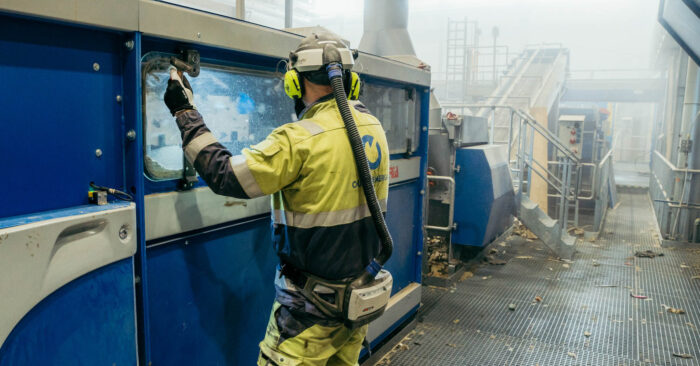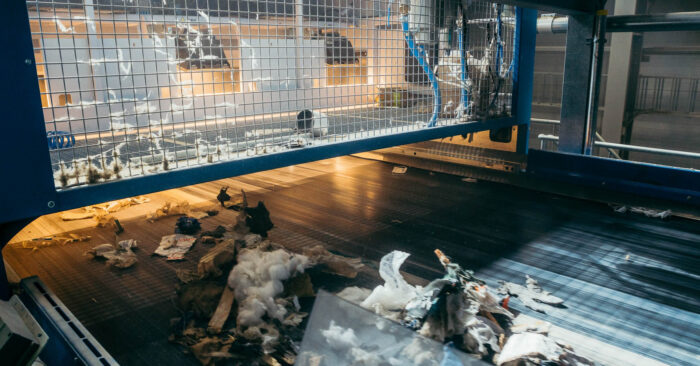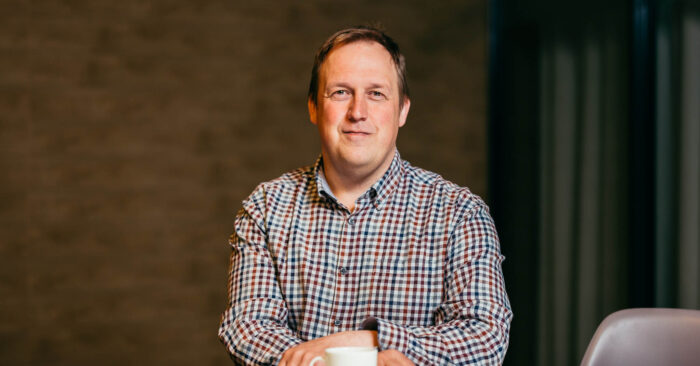
Waste sorting is a key factor in a circular economy
The waste sorting plant in Rusko, Oulu, tirelessly crushes, sorts, and refines 100,000 tonnes of commercial waste for reuse every year. With the help of modern technology, the correct waste processing route can be found for the demolition, commercial, and industrial waste that enters the facility. By sorting the waste, we are able to separate fibres, plastics, Solid Recovered Fuel (SRF), metals, and earthworks materials.
Modern sorting plants separate valuable materials
The Syklo waste sorting plant, which began operating in 2021, runs during weekdays in two 12-hour shifts. The modern sorting process has many stages and involves both state-of-the-art operating models and laws of physics. The people at Syklo ensure that the waste moves through the plant following exactly the path planned for it, and that the sorted material is reused.

Preliminary waste sorting is done using an excavator, the driver of which sorts big metal pipes and pieces of plastic from the waste with the shovel of the loader with astonishing skill. The driver’s advanced shovel motor coordination is very precise, surpassing even the best robots with his or her skills.
The rest of the mass continues its journey through the crusher to the sorting line, where the separation of material suitable for material reclamation begins. First, the material goes through a sorting machine, where it is separated by size. Metal separation occurs during the next stage of the process using magnets and eddy current separators. Next, the wind sorter blows the lightest parts into its own further processing.

In addition to metals, the sorting finds fines for earthworks use, recycled wood, and Solid Recovered Fuel. The whole process, from start to finish, can take only a few minutes, depending on the fractions!
Reusable material continues its journey to be made into new products
Material of consistent quality created as an end product of the sorting process continues its journey to its next station, as raw material for industry, for example. Syklo’s partners are responsible for the reuse of the material.
Good quality Solid Recovered Fuel (SRF) is also created during the sorting process. The Solid Recovered Fuel Syklo produces generally contains wood, various plastics, cardboard, and paper. For the most part, recycled fuel is free of fossil carbon dioxide and has a high calorific value. Nowadays, it replaces peat, which is classified as a non-renewable fuel, and virgin biomasses.

The quality of SRF generated by the sorting equipment is ensured with an optical NIR (near infrared) sorter. NIR devices make it possible to choose which materials to remove from the waste stream, and which to let pass through as material for fuel. This ensures, for example, the consistent quality of the fuel, and minimises the pollutant load. SRF is delivered from Rusko to Oulun Energia’s biopower plant, where it is converted into electricity and district heating for the residents of the Oulu region.
Waste sorting to be more efficient in the future
Syklo does not want to contend with only the current situation, but instead ambitiously seeks new recycling solutions for materials with its partners. Syklo’s waste sorting plant is built to be expandable in the future.
“Even during the construction phase, we were preparing for the possibility of integrating new equipment to the plant if we wanted to start recovering completely new fractions. We can also bring completely new technology, such as robotics, into the sorting plant if necessary,” shares Syklo’s circular economy manager, Heikki Harju-Autti.

The adaptability of the waste sorting plant also reflects Syklo’s service attitude.
“The aim is to offer waste suppliers comprehensive and cost-effective service solutions that the partners can trust in all situations. At Syklo, we look for possibilities instead of impossibilities,” states Harju-Autti.
By providing quality waste treatment services, Syklo has elevated the circular economy of northern Finland to a new growth path. Efficient sorting replaces virgin raw materials, which allows it to be more environmentally efficient. The company’s next goal is to expand its operations throughout Finland and to conquer international markets.
“The goal is to reach the peak of the circular economy and the circularity of materials. At the same time, we are promoting the preservation of the carrying capacity of the environment and reducing the throwaway culture around which our entire society currently revolves. It is important to think about consumption holistically,” explains Harju-Autti.
Waste sorting—10 facts about Syklo
- Syklo’s waste treatment services receive a total of 260,000 tonnes of waste annually.
- The waste treatment plant processes 100,000 tonnes of waste annually.
- It accepts commercial and industrial waste, and construction and demolition waste.
- The materials obtained from waste sorting are utilised in industry, for example, and the sorted waste is turned into new products.
- Rusko’s waste sorting plant is state-of-the-art, and it can be modified to meet future waste sorting needs.
- Waste sorting is carried out on several different sorting machinery, which include different sieves, wind sorters, NIR devices, and magnets.
- The aim is to expand waste sorting and the utilisation of materials to include ever more materials.
- In the future, a significantly higher percentage of waste will be sorted at Syklo than at present.
Read more about our circular economy services and products here! >
